Today Current Affairs: 25th May 2022 for UPSC IAS exams, State PSC exams, SSC CGL, State SSC, RRB, Railways, Banking Exam & IBPS, etc
Table of Contents
ASHA Workers As Global Health Leaders : WHO
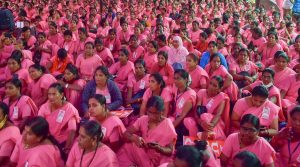
The World Health Organisation has recognised the country’s 10.4 lakh ASHA (Accredited Social Health Activist) workers as ‘Global Health Leaders’ for their efforts in connecting the community to the government’s health programmes.
- ASHA workers are volunteers from within the community who are trained to provide information and aid people in accessing benefits of various healthcare schemes of the government.
- They act as a bridge connecting marginalised communities with facilities such as primary health centres, sub-centres and district hospitals.
- The role of these community health volunteers under the National Rural Health Mission (NRHM) was first established in 2005.
- ASHAs are primarily married, widowed, or divorced women between the ages of 25 and 45 years from within the community.
- They must have good communication and leadership skills; should be literate with formal education up to Class 8, as per the programme guidelines.
- The aim is to have one ASHA for every 1,000 persons or per habitation in hilly, tribal or other sparsely populated areas.
- There are around 10.4 lakh ASHA workers across the country, with the largest workforces in states with high populations – Uttar Pradesh (1.63 lakh), Bihar (89,437), and Madhya Pradesh (77,531).
- Goa is the only state with no such workers, as per the latest National Health Mission data available from September 2019.
World Of Work Report : ILO
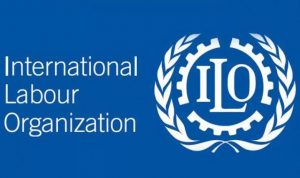
The “world of work” is being buffeted by multiple crises, says the ninth edition of the International Labour Organisation (ILO) Monitor.
- After significant gains during the last quarter of 2021, the number of hours worked globally dropped in the first quarter of 2022, to 3.8 per cent below the pre-crisis benchmark (fourth quarter of 2019).
- This is equivalent to a deficit of 112 million full-time jobs.
- Multiple new and interconnected global crises, including inflation (especially in energy and food prices), financial turbulence, potential debt distress, and global supply chain disruption – exacerbated by war in Ukraine – means there is a growing risk of a further deterioration in hours worked in 2022.
- The gender gap in hours worked also grew during the pandemic.
- The report spells out a series of measures as a way forward, which are in line with ILO’s Global Call to Action for a human-centred recovery , and the ILO-led UN initiative, the Global Accelerator for Jobs and Social Protection.
Defamation Suit Against Shiv Sena’s Sanjay Raut:

BJP leader Kirit Somaiya’s wife Medha has filed a civil defamation suit against Shiv Sena’s Sanjay Raut.
- Somaiya sought court to direct Raut either pay her Rs 100cr or deposit amount in CM relief fund.
- Raut had repeatedly made defamatory public statements against her and her husband, she claimed.
- Defamation is the communication of a false statement that harms the reputation of an individual person, business, product, group, government, religion, or nation.
- In India, defamation can both be a civil wrong and a criminal offence. The difference between the two lies in the objects they seek to achieve.
- A civil wrong tends to provide for a redressal of wrongs by awarding compensation and a criminal law seeks to punish a wrongdoer and send a message to others not to commit such acts.
Legal provisions:
- Criminal defamation has been specifically defined as an offence under section 499 of the Indian Penal Code (IPC).
- Civil defamation is based on tort law (an area of law which does not rely on statutes to define wrongs but takes from an ever-increasing body of case laws to define what would constitute a wrong).
- Section 499 states defamation could be through words, spoken or intended to be read, through signs, and also through visible representations.
- Section 499 also cites exceptions. These include “imputation of truth” which is required for the “public good” and thus has to be published, on the public conduct of government officials, the conduct of any person touching any public question and merits of the public performance.
- Section 500 of IPC, which is on punishment for defamation, reads, “Whoever defames another shall be punished with simple imprisonment for a term which may extend to two years, or with fine, or with both.”
India, US Ink Investment Incentive Agreement:
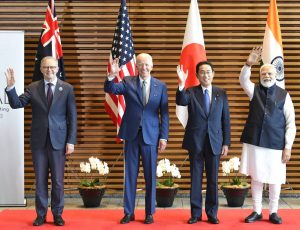
The Government of India and the Government of the United States of America has signed an Investment Incentive Agreement (IIA) at Tokyo, Japan.
- This IIA supersedes the Investment Incentive Agreement signed between the two sides in 1997.
- Significant developments have taken place since the signing of the earlier IIA in 1997 including the creation of a new agency called DFC, a development finance agency of Government of USA, as a successor agency of the erstwhile Overseas Private Investment Corporation (OPIC) after the enactment of a recent legislation of USA, the BUILD Act 2018.
- IIA has been signed, to keep pace with the additional investment support programmes, offered by the DFC, such as debt, equity investment, investment guaranty, investment insurance or reinsurance, feasibility studies for potential projects and grants.
- The Agreement is the legal requirement for DFC, to continue providing investment support in India. DFC or their predecessor agencies are active in India since 1974 and have so far provided investment support worth $5.8 billion of which $2.9 billion is still outstanding.
New Karst Sinkhole:

A cave exploration team has discovered an ancient forest with trees nearly 40 metres high at the bottom of a giant karst sinkhole in Leye County in south China’s Guangxi Zhuang Autonomous Region.
- In Mandarin, giant sinkholes are called Tiankeng or “heavenly pit”.
- Sinkholes are depressions formed in the ground when layers of the Earth’s surface start collapsing into caverns.
- They can occur suddenly and without warning, because the land under the surface of the Earth can stay intact for a period of time until the spaces get too big.
- Sinkholes can be formed due to natural processes or human activity.
- Typically, sinkholes form in areas of “karst” terrains, where the rock below the surface of the Earth can be easily dissolved by groundwater.
- Karst terrain is created from the dissolution of soluble rocks, mostly limestone and dolomite and is characterised by distinctive landforms such as caves, sinkholes and springs.
- Sinkholes can also be formed due to human activity due to broken land drains, water mains and sewerage pipes, increased rainfall, storm events, underlying limestone and diverted surface water, among other reasons.
Indo-Pacific Economic Framework (IPEF):
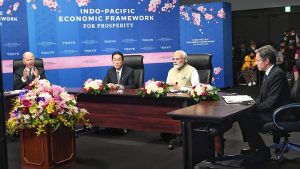
India’s Prime Minister participated in an event in Tokyo to launch the Indo-Pacific Economic Framework (IPEF).
- This economic initiative came a day before the second in-person summit of the Quad leaders (India, the US, Australia and Japan) in Tokyo.
- It is a US-led initiative that aims to strengthen economic partnership among participating countries to enhance resilience, sustainability, inclusiveness, economic growth, fairness, and competitiveness in the Indo-Pacific region.
- The IPEF was launched with a dozen initial partners who together represent 40% of the world GDP.
- Opportunity for Indo-Pacific Region: It is a declaration of a collective desire to make the Indo-Pacific region an engine of global economic growth.
- The Indo-Pacific covers half the population of the world and more than 60% of the global GDP and the nations who will join this framework in the future, are signing up to work toward an economic vision that will deliver for all people.
- Unlike traditional trade blocs, IPEF won’t negotiate tariffs or market access, and the framework will focus on integrating partner countries in four areas which include:
- It intends to build high-standard, inclusive, free, and fair-trade commitments and develop new and creative approaches in trade and technology policy that advance a broad set of objectives that fuels economic activity and investment, promotes sustainable and inclusive economic growth, and benefits workers and consumers.
- IPEF is committed to improving transparency, diversity, security, and sustainability in supply chains to make them more resilient and well-integrated.
- To coordinate crisis response measures; expand cooperation to better prepare for and mitigate the effects of disruptions to better ensure business continuity; improve logistical efficiency and support; and ensure access to key raw and processed materials, semiconductors, critical minerals, and clean energy technology.
- In line with the Paris Agreement goals and efforts to support the livelihood of peoples and workers, it plans to accelerate the development and deployment of clean energy technologies to decarbonize our economies and build resilience to climate impacts.
- This also involves deepening cooperation on technologies, on mobilizing finance, including concessional finance, and on seeking ways to improve competitiveness and enhance connectivity by supporting the development of sustainable and durable infrastructure and by providing technical assistance.
- It is committed to promoting fair competition by enacting and enforcing effective and robust tax, anti-money laundering, and anti-bribery regimes in line with existing multilateral obligations, standards, and agreements to curb tax evasion and corruption in the Indo-Pacific region.
- This involves sharing expertise and seeking ways to support the capacity building necessary to advance accountable and transparent systems.
- India’s trade in this region is growing rapidly, with overseas investments being directed towards the East, e.g., the Comprehensive Economic Partnership Agreements with Japan, South Korea, and Singapore, and the Free Trade Agreements with ASEAN (Association of Southeast Asian Nations) and Thailand.
- India has been active in championing a Free and Open Indo-Pacific.
- The US, Australia, and the members of the ASEAN have all expressed a common view that India plays a greater role in the region.
- India, along with its Quad partners, is upping its game in the Indo-Pacific.
- India’s view is to work with other like-minded countries in the Indo-Pacific region to cooperatively manage a rules-based multipolar regional order and prevent any single power from dominating the region or its waterways.
Indira Gandhi Shahri Rozgar Guarantee Yojana:

The Rajasthan government has come up with the job description under its much-touted Indira Gandhi Shahri Rozgar Guarantee Yojana.
- Announcing the employment scheme for urban areas on the lines of Mahatma Gandhi NREGA for rural areas in his budget speech
- While MGNREGA assists people in rural areas, there is no such scheme for street vendors, as well as those working at dhabas and restaurants in urban areas.
- Under the scheme, 100 days of employment per year will be provided to families residing in urban areas.
- The ratio of cost of material to payment for labour work of “general nature” will be in the ratio of 25:75, while for special works, it will be 75:25.
- The focus is on providing as many jobs as possible.
- On the other hand, creation of assets will require a higher material component, hence under ‘special works’ the ratio is 75:25.
- All those aged between 18 and 60 years and residing within urban body limits are eligible for the scheme, and in special circumstances such as a pandemic or a calamity, migrant labourers may be included.
New Lieutenant-Governor (L-G) Of Delhi :Vinai Kumar Saxena
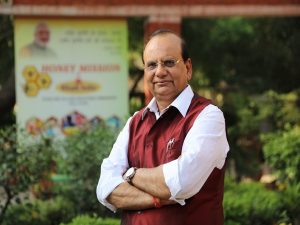
Vinai Kumar Saxena, Chairman of Khadi and Village Industries Commission, has been appointed the new Lieutenant-Governor (L-G) of Delhi.
- President Ram Nath Kovind accepted the resignation of Anil Baijal from the post and appointed Vinai Kumar Saxena to be the Lt. Governor of National Capital Territory of Delhi with effect from the date he assumes charge of his office.
- Saxena, in 1991, had formed an NGO, National Council for Civil Liberties, which opposed Medha Patkar’s Narmada Bachao Andolan.
- Saxena is one of the members of the national committee to commemorate the 75th anniversary of India’s Independence.
- This committee is headed by Prime Minister Narendra Modi.




